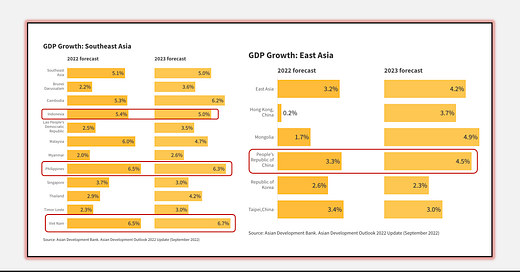For the First Time in 30 Years, China Is Growing Slower Than the Rest of Asia.
Vietnam benefits in particular from the country's new attractiveness to multinationals due to Xi Jinping's inflexible zero-COVID policy.
Just some weeks before the start of the 20th National Congress of the Chinese Communist Party, Xi Jinping is facing a brutal economic cooling in China. In their new study unveiled Wednesday, September 21, 2022, on the economic outlook in the region, economists from the Asian Development Bank (ADB) estimate that the growth of the second largest economy i…
Keep reading with a 7-day free trial
Subscribe to Sylvain Saurel’s Newsletter to keep reading this post and get 7 days of free access to the full post archives.



